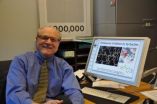(Press-News.org) Decision makers who feel powerful and in control of resources are more likely than others to make decisions that will benefit their future selves, according to researchers at the USC Marshall School of Business.
Conversely, those who lack feelings of power tend to prefer smaller immediate gains – those that benefit the present self – to potentially greater benefits in the future, according to "Power and Reduced Temporal Discounting," a research paper by Nathanael Fast, an assistant professor of management and organization at and Priyanka Joshi, a doctoral candidate in management and organization at the USC Marshall School of Business. The paper is in the current issue of Psychological Science.
A pervasive tendency among decision makers to opt for immediate gratification – known as temporal discounting – has implications for everything from investing money and saving for retirement to developing a business strategy, Fast said. For more than a decade, researchers in numerous disciplines have sought ways to overcome temporal discounting because it is so widespread.
Joshi and Fast hypothesized that one of the ways to help people wait for larger future benefits in lieu of small immediate gains is to make them feel more powerful. "Consistent with our predictions, we found that feeling powerful actually increased people's willingness to wait for larger rewards," reported Joshi. "We also found that the experience of power in the workplace is positively correlated with one's total accrued assets, even after controlling for more likely factors such as annual income and age." In other words, power appears to foster saving behavior by putting people more in touch with their future selves.
"Power provides control over future outcomes, so the future seems more certain when you feel powerful." Fast said. "You're therefore more likely to expand your sense of self to include your future self and, as a result, consider long-term consequences when making decisions."
Decision makers may better connect
with their future selves by "power priming," or thinking of a time in their lives when they did have power over others, Joshi said. "By revisiting experiences from the past, one typically experiences the same feelings they had during that time," she said. "Of course, the best way for organizations to make their employees feel powerful is to actually give them more power."
"Our research doesn't mean that power holders are always going to make the best decisions," said Fast. "Power also leads to greater risk-taking, illusory control, and heightened reward sensitivity, all tendencies that can lead to disinhibition and poor decision making. Yet, power holders do often make good decisions and they may be particularly good at considering future consequences." Indeed, as Fast noted, we often think of the best leaders as being visionary and helping subordinates adopt these future goals and aspirations. In this way, perhaps the experience of power is an essential part of what allows effective leaders to lead.
### END
Power connects decision makers to the future
New USC Marshall study shows how power can embolden decision makers
2013-02-20
ELSE PRESS RELEASES FROM THIS DATE:
International space station plays host to innovative infectious disease research
2013-02-20
Performing sensitive biological experiments is always a delicate affair. Few researchers, however, contend with the challenges faced by Cheryl Nickerson, whose working laboratory aboard the International Space Station (ISS) is located hundreds of miles above the Earth, traveling at some 17,000 miles per hour.
Nickerson, a microbiologist at Arizona State University's Biodesign Institute, is using the ISS platform to pursue new research into the effects of microgravity on disease-causing organisms.
Nickerson presented her research findings and charted the course for ...
UCLA study suggests link between untreated depression, response to shingles vaccine
2013-02-20
Can an individual's state of mind effect how well a vaccine may work? In the case of seniors and shingles, the answer is yes.
Reporting in the current online edition of the journal Clinical Infectious Diseases, Dr. Michael Irwin, a professor of psychiatry at the Semel Institute for Neuroscience and Human Behavior at UCLA, demonstrates a link between untreated depression in older adults and decreased effectiveness of the herpes zoster —or shingles — vaccine.
Shingles is a painful, blistering skin rash that can last for months or even years. It's caused by the varicella–zoster ...
BUSM authors propose potential epigenetic mechanisms for improved cancer therapy
2013-02-20
(Boston) – A review article by researchers at Boston University School of Medicine (BUSM) proposes a new epigenetic hypothesis linked to tumor production and novel ideas about what causes progenitor cells to develop into cancer cells. Published in the February 2013 issue of Epigenomics, the article provides examples of how epigenetic drug treatments could be beneficial in treating cancers while also decreasing the likelihood of cancer relapse.
The article was written by researchers at the Boston University Cancer Center. Sibaji Sarkar, PhD, adjunct instructor of medicine ...
Infants in poverty show different physiological vulnerabilities to the care-giving environment
2013-02-20
Some infants raised in poverty exhibit physical traits that make them more vulnerable to poor caregiving, according to new research published in Psychological Science, a journal of the Association for Psychological Science. The combination of physiological vulnerability and poor caregiving may lead these children to show increased problem behaviors later in childhood.
For infants growing up in poverty, the ability to adapt and regulate — both biologically and behaviorally — in response to various environmental pressures seems to be critical for successful development.
To ...
Rewriting a receptor's role
2013-02-20
In a pair of new papers, researchers at the University of California, San Diego School of Medicine and the Royal Netherlands Academy of Arts and Sciences upend a long-held view about the basic functioning of a key receptor molecule involved in signaling between neurons, and describe how a compound linked to Alzheimer's disease impacts that receptor and weakens synaptic connections between brain cells.
The findings are published in the Feb. 18 early edition of the Proceedings of the National Academy of Sciences.
Long the object of study, the NMDA receptor is located ...
IU research: Rock-paper-scissors a parable for cycles in finance, fashion, politics and more
2013-02-20
BLOOMINGTON, Ind. -- Using a grown-up version of the rock-paper-scissors game, Indiana University cognitive scientists offer a new theory of the group dynamics that arise in situations as varied as cycles of fashion, fluctuations of financial markets, eBay bidding wars and political campaign strategies.
In a study written about this week in PLOS ONE, the researchers analyzed situations in which each person's decision depends on what they think other people will decide, looking at the riddle of "what you think I think you think I think."
What they found, said Seth Frey, ...
New compound holds high promise in battling kidney cancer
2013-02-20
RIVERSIDE, Calif. — Chemists at the University of California, Riverside have developed a compound that holds much promise in the laboratory in fighting renal (kidney) cancer.
Named TIR-199, the compound targets the "proteasome," a cellular complex in kidney cancer cells, similar to the way the drug bortezomib, approved by the Food and Drug Administration, targets and inhibits the proteasome in multiple myeloma cells, a cancer coming from bone marrow.
Michael Pirrung, a distinguished professor of chemistry at UC Riverside, announced the development of TIR-199 in a lecture ...
Diagnosis and treatment now possible for osteoarthritic cats
2013-02-20
VIDEO:
Scientists at the University of Montreal's Quebec Research Group in Animal Pharmacology have found a way to recognize and treat osteoarthritis in cats -- a condition that the owner might...
Click here for more information.
Scientists at the University of Montreal's Quebec Research Group in Animal Pharmacology have found a way to recognize and treat osteoarthritis in cats – a condition that the owner might not notice and that can make even petting painful. "Osteoarthritis ...
Stanford researchers develop tool for reading the minds of mice
2013-02-20
If you want to read a mouse's mind, it takes some fluorescent protein and a tiny microscope implanted in the rodent's head.
Stanford scientists have demonstrated a technique for observing hundreds of neurons firing in the brain of a live mouse, in real time, and have linked that activity to long-term information storage. The unprecedented work could provide a useful tool for studying new therapies for neurodegenerative diseases such as Alzheimer's.
The researchers first used a gene therapy approach to cause the mouse's neurons to express a green fluorescent protein ...
That's the way the droplets adhere
2013-02-20
CAMBRIDGE, MA -- Understanding exactly how droplets and bubbles stick to surfaces — everything from dew on blades of grass to the water droplets that form on condensing coils after steam drives a turbine in a power plant — is a "100-year-old problem" that has eluded experimental answers, says MIT's Kripa Varanasi. Furthermore, it's a question with implications for everything from how to improve power-plant efficiency to how to reduce fogging on windshields.
Now this longstanding problem has finally been licked, Varanasi says, in research he conducted with graduate student ...
LAST 30 PRESS RELEASES:
Cal Poly’s fifth Climate Solutions Now conference to take place Feb. 23-27
Mask-wearing during COVID-19 linked to reduced air pollution–triggered heart attack risk in Japan
Achieving cross-coupling reactions of fatty amide reduction radicals via iridium-photorelay catalysis and other strategies
Shorter may be sweeter: Study finds 15-second health ads can curb junk food cravings
Family relationships identified in Stone Age graves on Gotland
Effectiveness of exercise to ease osteoarthritis symptoms likely minimal and transient
Cost of copper must rise double to meet basic copper needs
A gel for wounds that won’t heal
Iron, carbon, and the art of toxic cleanup
Organic soil amendments work together to help sandy soils hold water longer, study finds
Hidden carbon in mangrove soils may play a larger role in climate regulation than previously thought
Weight-loss wonder pills prompt scrutiny of key ingredient
Nonprofit leader Diane Dodge to receive 2026 Penn Nursing Renfield Foundation Award for Global Women’s Health
Maternal smoking during pregnancy may be linked to higher blood pressure in children, NIH study finds
New Lund model aims to shorten the path to life-saving cell and gene therapies
Researchers create ultra-stretchable, liquid-repellent materials via laser ablation
Combining AI with OCT shows potential for detecting lipid-rich plaques in coronary arteries
SeaCast revolutionizes Mediterranean Sea forecasting with AI-powered speed and accuracy
JMIR Publications’ JMIR Bioinformatics and Biotechnology invites submissions on Bridging Data, AI, and Innovation to Transform Health
Honey bees navigate more precisely than previously thought
Air pollution may directly contribute to Alzheimer’s disease
Study finds early imaging after pediatric UTIs may do more harm than good
UC San Diego Health joins national research for maternal-fetal care
New biomarker predicts chemotherapy response in triple-negative breast cancer
Treatment algorithms featured in Brain Trauma Foundation’s update of guidelines for care of patients with penetrating traumatic brain injury
Over 40% of musicians experience tinnitus; hearing loss and hyperacusis also significantly elevated
Artificial intelligence predicts colorectal cancer risk in ulcerative colitis patients
Mayo Clinic installs first magnetic nanoparticle hyperthermia system for cancer research in the US
Calibr-Skaggs and Kainomyx launch collaboration to pioneer novel malaria treatments
JAX-NYSCF Collaborative and GSK announce collaboration to advance translational models for neurodegenerative disease research
[Press-News.org] Power connects decision makers to the futureNew USC Marshall study shows how power can embolden decision makers



